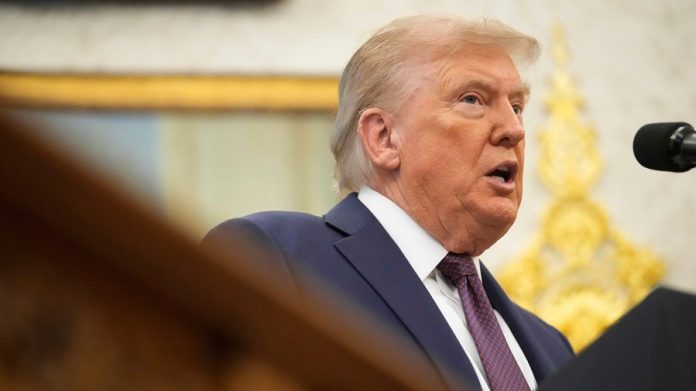
The courts have delivered President Trump a striking flurry of defeats this week on hot-button issues.
Even if Trump challenges the decisions, which seems almost certain, the verdicts at the least have the capacity to disrupt his efforts to asset his power in ever more expansive ways.
On Tuesday alone, courts hit at two deeply contentious Trump policies, declaring his deployment of the National Guard in Los Angeles earlier this year to have been illegal, and preventing him from using the Alien Enemies Act to deport Venezuelan migrants.
Also on Tuesday, an appeals court ruled in favor of Rebecca Kelly Slaughter, whom Trump has sought to fire as a Federal Trade Commissioner. An earlier court had ordered Slaughter reinstated and the appellate court declined a bid from the administration to have that decision put on ice.
The following day, yet another court voided the administration’s efforts to choke off more than $2 billion in research funding to Harvard amid the long-running battle between Trump and the nation’s oldest university.
Separately, the president has already embarked on the effort to have an adverse decision from last week overturned.
Last Friday, the U.S. Court of Appeals for the Federal Circuit ruled that he did not have the authority, under a 1977 law, to impose many of his signature tariffs. Trump took to social media in the aftermath to lambaste the allegedly “Radical Left group of judges” who had delivered the 7-4 ruling.
On Wednesday, lawyers for the administration urged the Supreme Court to overturn that verdict as quickly as possible. Solicitor General John Sauer wants the high court to swiftly affirm they will take the case, and then hear oral arguments in early November.
Trump does, to be sure, have a friendly Supreme Court. It has a 6-3 conservative majority and he nominated three of the six right-leaning justices during his first term. The Court has already shown a propensity to thwart blocks placed on Trump’s actions in other matters.
This pattern, especially the use of the so-called “shadow docket” by which emergency motions can be issued with little or no explanation, has alarmed some observers and liberal critics.
Alice Bannon of the Brennan Center for Justice wrote last month that the administration’s “overall use of the shadow docket has skyrocketed. In the first 20 weeks of Trump’s second term, the administration sought emergency action by the Court 19 times…And the Court has sided with the administration nearly ever time.”
Furthermore, the decisions from the high court’s conservative majority in Trump’s favor have provoked unusually intense anguish from the liberal justices.
Dissenting in a case that curtailed the use of nationwide injunctions, Justice Ketanji Brown Jackson contended that the majority had rendered a verdict amounting to “an existential threat to the rule of law.”
The blizzard of court setbacks are a problem for Trump. Some, such as the Harvard decision, weaken his hand in ongoing negotiations. Others, like those pertaining to deportations or to the deployment of the National Guard, strike at his agenda on emotive issues such as immigration, and crime.
The rebukes that have been delivered to him have been notably fierce as well.
For example, Trump and his administration had argued that they could use the Alien Enemies Act to deport Venezuelan migrants it alleges belong to the criminal gang Tren de Aragua.
The 1798 law provides for the removal of “alien enemies” during a war with the U.S. or where there is an “invasion or predatory incursion…against the territory of the United States by any foreign nation or government.”
The administration has argued that illegal immigration by gang members satisfies the second part of this requirement because, it alleges, Tren de Aragua is under the influence of the Venezuelan government of Nicolas Maduro.
But the Court of Appeals for the Fifth Circuit found flatly the administration was wrong, halting removals under the Act because “we find no invasion or predatory incursion.”
In the National Guard-related case, U.S. District Court Judge Charles Breyer found that, in Los Angeles, the administration had violated the centuries-old legislation that, in general, prevents the use of the military as a tool of domestic law enforcement.
Breyer further found that the administration had done so “willfully,” had engaged in the “complete sidelining” of the state and the local authorities, and “knew that they were ordering troops to execute domestic law beyond their usual authority.”
The verdict in that case has a larger political salience as Trump publicly mulls the deployment of federal forces to Chicago.
Trump has, of course, tangled with the courts throughout his career in politics, blasting judges as being too left-wing, too radical or otherwise biased against him. Allies have joined him in alleging a “judicial coup” when other adverse rulings have come down.
And the past few days haven’t been entirely bleak of him. An appeals court found on Thursday that the controversial detention center in the Florida Everglades known as “Alligator Alcatraz” can stay open for now.
Still, all this comes at a time when Trump has rolled over his political opposition and has exerted his muscle against the media, private law firms and individual enemies.
The courts are, for now, proving less malleable to his wishes.
The Memo is a reported column by Niall Stanage.

